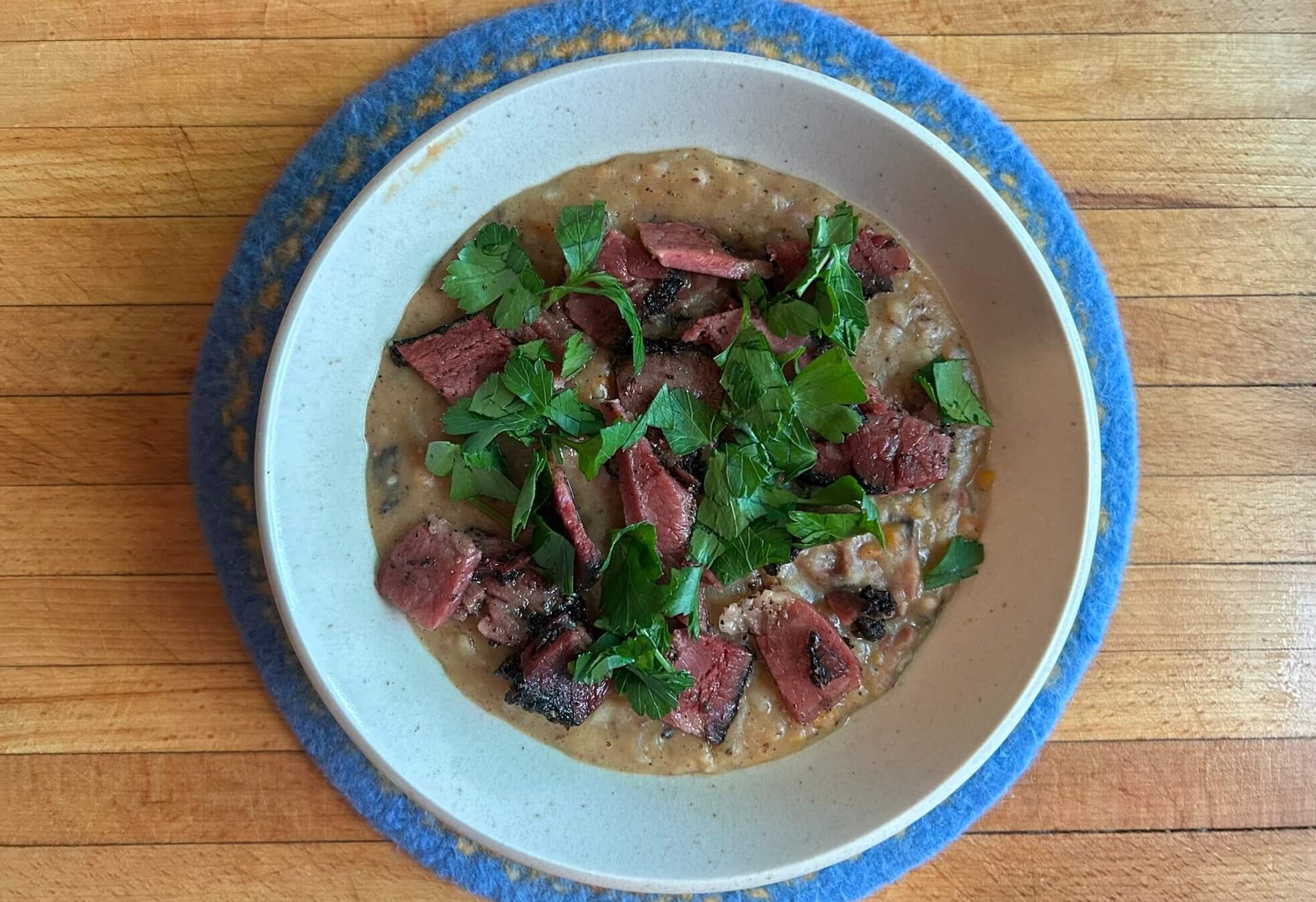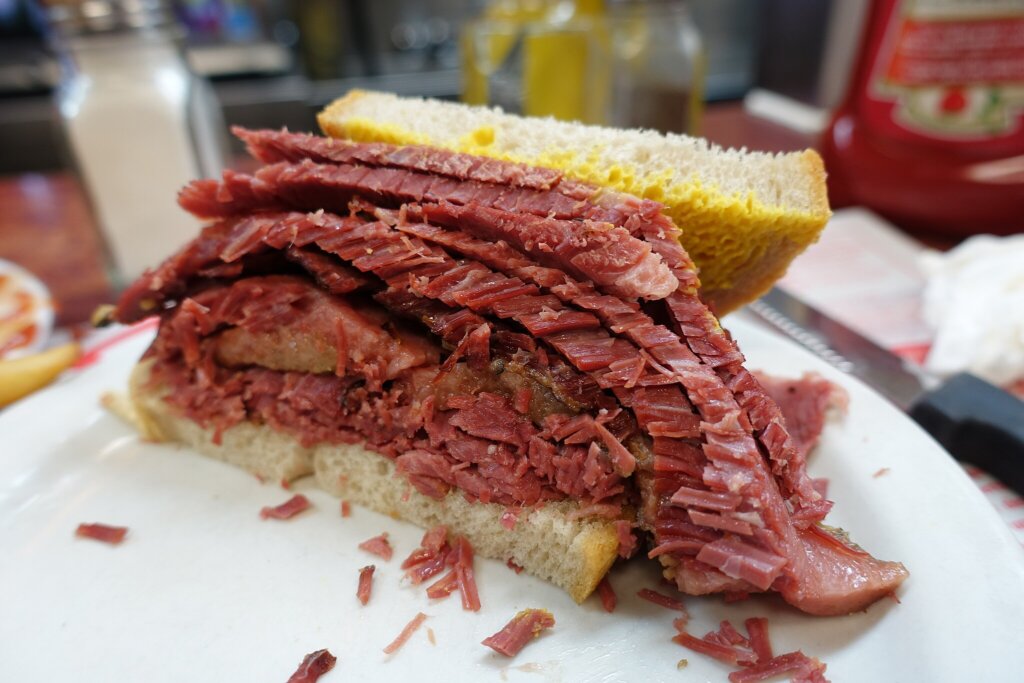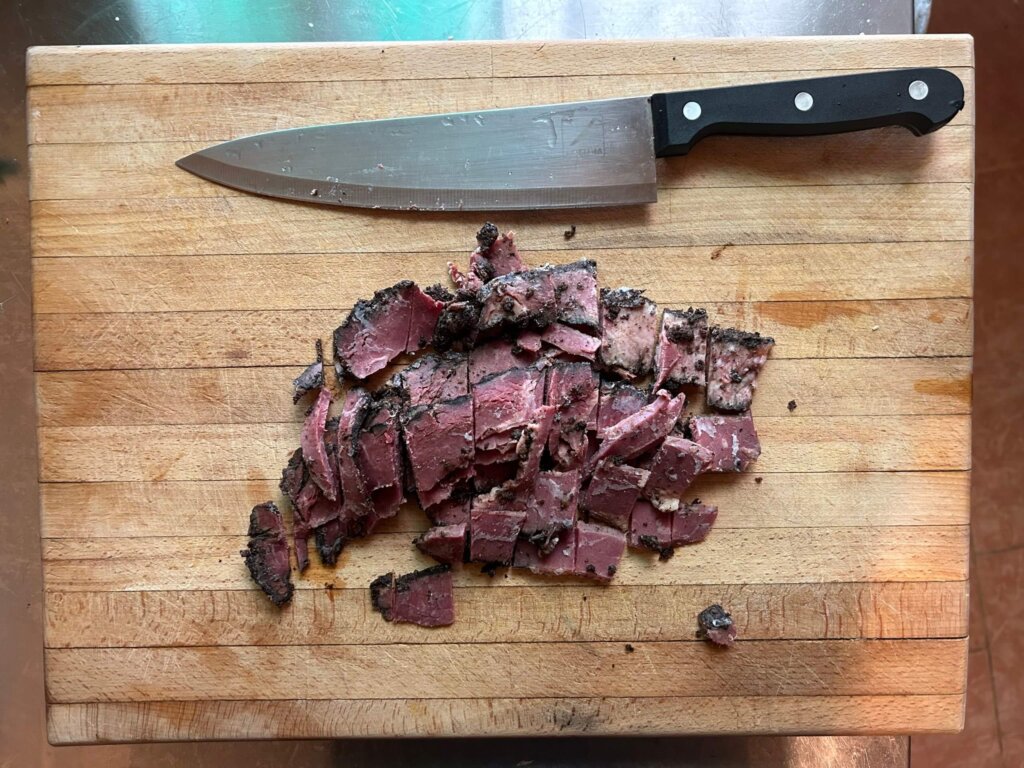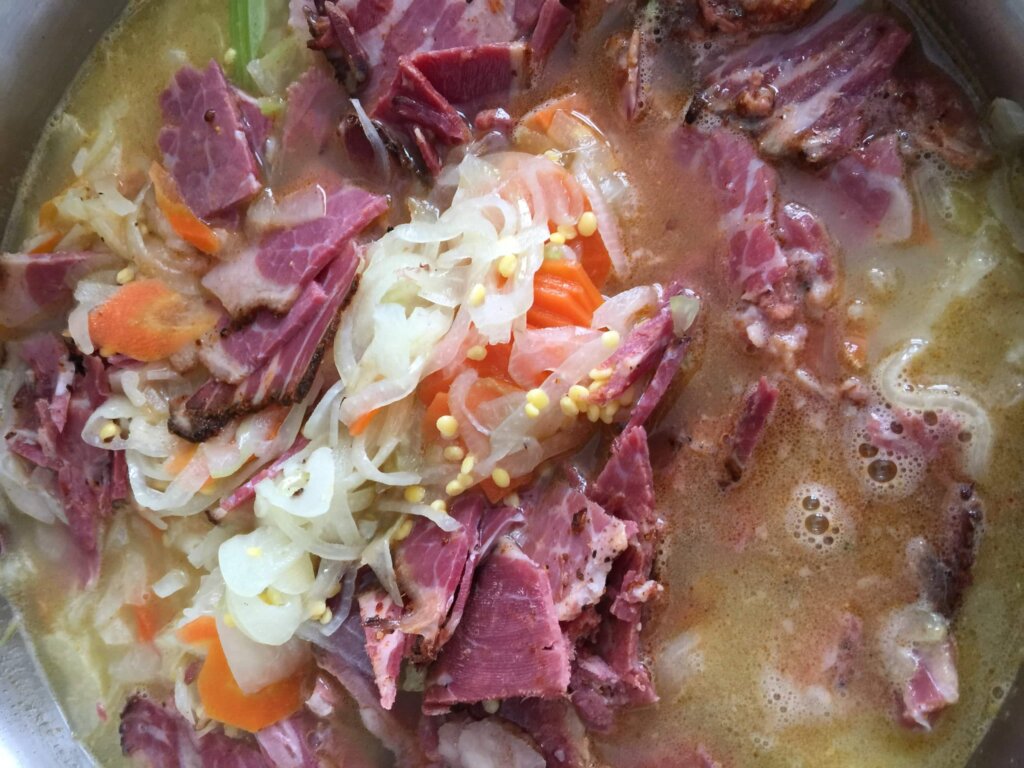The Jewish soup that keeps people warm at the ‘end of the universe’
How a Newfoundland chef’s stew of smoked meat and split peas becomes a pastrami pea soup in Brooklyn

Jonathan Richler’s smoked meat pea soup takes inspiration from Montreal, Newfoundland, and the Jewish diaspora.
Today might be the 10th day of spring in New York, but winter won’t quite release its grip. On Sunday morning, before I left the house for a walk, the Weather Channel told me that with wind chill, the air would feel like it was in the 20s. The meteorologists weren’t lying.
I’ve been comforting myself with an old Jewish maxim: It could be much worse.
I could be in Galicia, the home of my paternal ancestors, where winters are even harsher than New York’s. Or I could be a member of Anchorage, Alaska’s self-proclaimed “Frozen Chosen” Jewish congregation.
Other members of the tribe have found ways to thrive in the cold, and so can I. In fact, by the time spring rolled around, I’d already spent several months searching for Jewish recipes that could turn these dark and dreary months into celebratory ones. This beginning of this stubborn shoulder season proved as good a time as any to test out the wisdom I had gathered.
The Newfoundland Jewish Deli
Soon after I started poking around for the cold weather recipes of my tribe, I stumbled upon the work of a Jewish chef in St. John’s, Canada, the capital of the province of Newfoundland and Labrador and the easternmost city in North America (excluding Greenland). Jonathan Richler operates a food business called “The Jewish Deli” that caters events, hosts pop-ups, and teaches cooking lessons in St. John’s. On Saturdays, he runs a stall by the same name at the St. John’s farmers market. Depending on the season, his menu might include duck shawarma, smoked brisket, or garlic scape pesto bagel sandwiches. His forthcoming book, the Jewish Deli Cookbook, will use recipes like these to marry the flavors of Ashkenazi, Sephardic and Newfoundland cuisine.
“We’re very much celebrating our own cuisine and our own culture here at the end of the universe,” he told me when I reached him by phone.
Among the many cold places where Jews have settled, Richler’s home is an oddball. Located on an island, it’s only accessible by ferry or plane. It was a British colony, and then an independent dominion until 1949, when voters elected to become a Canadian province. When I called Richler, I got the time wrong because Newfoundland occupies its own time zone, which is 1.5 hours later than Eastern Standard. Though the island’s climate is relatively mild for its latitude, thanks to the North Atlantic current, it’s still unpleasantly cold for a spoiled New Yorker like me.

Richler, 52, hails from a family of Montreal Jewish royalty: Richler’s paternal great-great-grandfather was Rabbi Yehuda Rosenberg, known for translating the Zohar from Aramaic into Hebrew and for popularizing the folk tale of the Golem of Prague; his uncle, Mordecai Richler, was a famous novelist and political gadfly whose portrait now occupies the side of a three-story building in Montreal.
Richler’s father and mother, a Francophone Quebecker who converted to Judaism from Catholicism, moved to St. John’s in the 1960s to escape the Quebec nationalist movement then gaining steam in Montreal. They raised him in the city’s small community of Jews, exposing the future chef to Ashkenazi classics in their home kitchen, through boxes of bagels and salami his bubbe hauled from Montreal, and on visits to New York and Toronto. As an adult living in Montreal and visiting Israel, he developed a taste for Sephardic and Mizrahi dishes like falafel and shawarma.
After he returned to his hometown, Richler found himself missing these foods. The community he grew up in had shrunk, with many Jews leaving for Nova Scotia, and Canada’s 2011 census counted only 175 members of the tribe in Newfoundland and Labrador.
Nine years ago, he took matters into his own hands. “I couldn’t find a good pickle or a good brisket, so I learned to make them,” he said. “My mission is to keep the Jewish vernacular available for the general public.”
To that end, he cooks — and gabs — with the whimsy and passion of the literary figures in his bloodline. “It’s a very expensive science experiment,” he said, of learning to prepare his own Montreal-style meat. “I probably smoked over 1300 briskets. I’ve laid my hands on a lot of beef. And I love it.”

He spreads the Jewish food gospel not with orthodoxy, but with flexibility, updating the Sephardic and Ashkenazi canon for Newfoundland’s tastes, as well its local ingredients. Smoked char makes its way onto the Jewish Deli’s bagels, and local mushrooms into its shawarma sandwiches.
During winter, for those with frozen fingers and chapped lips, Richler offers an autobiography in the form of stew: a split pea soup spiked with his home-smoked beef. The creamy, mustard-colored pea soup is a nod to a French Canadian classic that typically relies on ham; he subs out the pork for Montreal-style smoked meat, a cousin of pastrami. Turnip and parsnip, crucial root vegetables in Newfoundland and Quebec cuisines, lend the soup an earthy sweetness.
Swapping Montreal smoked meat for Brooklyn pastrami
Some 3,000 miles southwest, in my own Brooklyn kitchen, I decided to try my hand at Richler’s alchemy. There was one catch: I live in the land of pastrami, not smoked meat.
Many food writers have opined on the differences between the two meats, but generally speaking, pastrami is wet brined before smoking, while its Montreal counterpart is dry rubbed in a more complex spice blend that includes — at least in Richler’s kitchen — allspice, alder, and garlic. According to Richler, pastrami tends to taste sweet, spicy, and smokey, while smoked meat is sour and smokey. It was my lot, then, to create a sweeter, more peppery version of his soup with New York’s favorite cured beef.

On an appropriately cold spring day, I strolled down to Moe’s Pastrami & Burger, my local halal and kosher-style deli, for 2 pounds of the good stuff (sorry David’s Brisket House — you’re not the only Brooklyn halal joint making top-notch Jewish food). The heaping portion of pastrami cost me $65, so if you’re on a budget, you might want to go with Boar’s Head.
Like all good soups, this one consigned me to a long afternoon of tending a boiling pot. I spent the first hour simmering yellow split peas with two marrow bones that filled the room with the bewitching aromas of beef stew. As they cooked, I chopped the smoked meat strips into manageable bites, feeling somewhat grateful that my grandfather wasn’t alive to see me mangle 2 pounds of good pastrami. Into the pot it went, along with a heaping pile of carrots, onion, turnip and parsnip that added an extra layer of peppery sweetness to the pot. I let it simmer for another hour, the humidity of my kitchen almost enough to make me forget the cold.
Topped with parsley and extra shaved pastrami, the pea soup was decadent and delicious. The legumes had broken down, adding their cream to the bone-marrow-and-root-vegetable broth. A mouthful of the stew now tasted of sweet turnip and parsnip, punctuated by pepper and parsley. Every other bite, I was treated to a chunk of pastrami. The hits of spiced, sinewy umami conjured up the image of a Jew in a sea of gentiles screaming out, “I’m here!”

As I sat savoring my soup, I heard splattering from the kitchen, and rushed in just in time to remember I had left the pot boiling furiously and burning at the edges. When I sampled another spoonful, some of the dish’s subtlety had been cooked out, replaced with extra peppery smoke. Don’t make the same mistake: Keep the heat low, use a thick pot, and if the stew starts to stick at the edges, stop cooking. I called Richler about my problem, and he said that people in my position had two options: scoop (don’t scrape) the soup into a new pot, or “crack open a beer and start over.”
I tried the former, hoping the soup would be helped by what Richler said was the Quebec tradition of letting the soup sit for a day before eating it. The next evening, I tasted the dish again with a friend who is a “frozen chosen” in her own right — a Jew from Omaha, Nebraska. We both found it tasty: Some of the sweet, aromatic notes had beaten back the bitter burnt ones overnight.
I asked my Nebraskan friend to imagine that she had come home on a cold evening to a warm bowl of this Jewish-Canadian concoction. How would it make her feel?
“Cozy,” she replied, and took another bite.

The following recipe is adapted with permission from Jonathan Richler.
Ingredients
- 2 cups yellow split peas, rinsed
- 2 small beef marrow bones
- 2 large carrots, peeled and medium diced
- 2 large to medium parsnips, peeled and finely diced
- 1 medium turnip or rutabaga, peeled and medium diced
- 1 large celery rib, diced
- 3 garlic cloves, crushed and minced
- 2 pounds Montreal smoked meat, corned beef, or pastrami, chopped into bite-sized pieces
Bouquet garni
- 4 sprigs fresh parsley
- 2 sprigs fresh rosemary
- A few bay leaves
- 3-5 dried allspice berries
Directions
- 1. Combine 8 cups of cold water, split peas, and beef marrow bones in a medium enamel or double-walled soup pot. Bring water to a boil, reduce to a simmer for 80 minutes. Stir occasionally to agitate the peas.
- 2. Meanwhile, prep the carrots, parsnips, rutabaga, celery, onion, garlic cloves, and meat. While not traditional in a split pea soup, we add turnip and parsnip as an homage to the Newfoundland and Quebec Sunday roast dinner plate.
- 3. Grab some cheesecloth and put together a bouquet garni with the prasley, rosemary, bay leaves, and allspice. Make a little pouch and tie it up, plop it in the pot. When finished you can easily extract the bouquet garni with no hunting and pecking for aromatics.
- 4. Extract the marrow bones from the soup pot and make sure the marrow has fallen into the hot water. If not just give it a poke with a butter knife. Marrow is a magic, buttery ingredient and should not be squandered.
- 5. Add the vegetables, aromatics, and beef to the pot, and add water to cover. Put the lid on and achieve a simmer on your stove top, careful to keep the flame as low as possible while maintaining a gentle simmer.
- 6. Cook for up to two hours or until the split peas begin to break down and create a creamy texture. Depending on what type of burner/pot apparatus you have, the contents may have a tendency to stick and burn on the bottom. Make sure you stir the pot every 10-15 minutes to avoid disappointing your people. If the soup begins to stick to the pot, stop cooking, and scoop — don’t scrape — the soup into another pot to finish the job.
- 7. Let the contents rest for a while before serving. Stir a few times and season to taste. Given the nature of a corned beef or smoked meat, not much in the way of salting is required, but please add salt and pepper to taste. The parsnip and turnip and allspice add a mild peppery flavor, so please judge accordingly.
- 8. For garnish, roughly chop some fresh parsley and cilantro, and add a small amount of shaved meat. Adding some canned and drained chickpea gives a nice texture — just make sure they’re warmed up. A bit of a sharp mustard and ground caraway seeds also add a nice touch to emulate a smoked meat sandwich.























